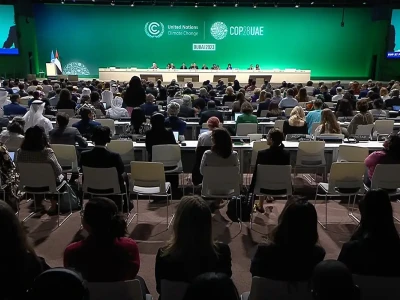
COP28 kicks off with climate disaster fund victory
CEO of the COP28 summit, told Reuters this month the aim was to secure several hundred million U.S. dollars for the climate disaster fund.
DUBAI, Nov 30 (Reuters) - The U.N. climate summit clinched an early victory Thursday, with delegates adopting a new fund to help poor nations cope with costly climate disasters.
COP28 President Sultan Ahmed al-Jaber said the decision sent a "positive signal of momentum to the world and to our work here in Dubai."
In establishing the fund on the first day of the two-week COP28 conference, delegates opened the door for governments to announce contributions.
And several did, kicking off a series of small pledges that countries hoped would build throughout the conference to a substantial sum, including $100 million from the COP28 host United Arab Emirates, at least $51 million from Britain, $17.5 million from the United States, and $10 million from Japan.
Later, the European Union pledged $245.39 million, which included $100 million pledged by Germany.
The early breakthrough on the damage fund, which poorer nations had demanded for years, could help grease the wheels for other compromises to be made during the two-week summit.
Alden Meyer of the think tank E3G said the approval for the "loss and damage" fund, as it's been called informally over the last two years, meant "not having either side play games and using L&D as a bargaining chip tied to other issues."
Share of GDP lost due to disasters between 2011 and 2021 in countries by income levels
Another task for the summit will be the global stocktake, an assessment of countries' progress in meeting the Paris Agreement goal of limiting global warming to well below 2 degrees Celsius (3.6 degrees Fahrenheit).
The fund's adoption "allows us now to focus on the global stocktake and the phase out of fossil fuels and build-up of renewable energy," said Jennifer Morgan, Germany's special climate envoy.
But some groups were cautious about celebrating the fund's early adoption, noting there were still unresolved issues including how the fund would be financed in the future.
"The absence of a defined replenishment cycle raises serious questions about the fund's long-term sustainability," said Harjeet Singh, head of global political strategy at Climate Action Network International.
Adnan Amin, CEO of the COP28 summit, told Reuters this month the aim was to secure several hundred million U.S. dollars for the climate disaster fund during the event.
Pope Francis, who was forced to cancel his trip to COP28 due to illness, sent a message on social media platform X: "May participants in #COP28 be strategists who focus on the common good and the future of their children, rather than the vested interests of certain countries or businesses. May they demonstrate the nobility of politics and not its shame."
A ROLE FOR FOSSIL FUELS
Earlier on Thursday, Jaber opened the summit by urging countries and fossil fuel companies to work together to meet global climate goals.
Governments are preparing for marathon negotiations on whether to agree, for the first time, to phase out the world's use of CO2-emitting coal, oil and gas, the main source of warming emissions.
Jaber, who is also the CEO of the United Arab Emirates' national oil company ADNOC, aimed to strike a conciliatory tone following months of criticism over his appointment at the head of COP28.
He acknowledged that there were "strong views" about the idea of including language on fossil fuels and renewables in the negotiated text.
"It is essential that no issue is left off the table. And yes, as I have been saying, we must look for ways and ensure the inclusion of the role of fossil fuels," he said.
He touted his country's decision to "proactively engage" with fossil fuel companies and noted that many national oil companies had adopted net-zero targets for 2050.
"I am grateful that they have stepped up to join this game-changing journey," Jaber said. "But, I must say, it is not enough, and I know that they can do much more."
Related
Related

Climate compensation fund vital for Maldives: Ministers

Top development banks to launch debt-for-nature swap 'task force'

Maldives seeks to take advantage of climate compensation fund

